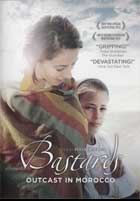
Bastards: Outcast in Morocco 2013
Distributed by Icarus Films, 32 Court St., 21st Floor, Brooklyn, NY 11201; 800-876-1710
Produced by Deborah Perkin; a Deborah Perkin Media Ltd Production
Directed by Deborah Perkin
DVD, color, 83 min.
College - General Adult
Muslims, Women, Marriage, Morocco
Date Entered: 05/04/2015
Reviewed by Carolyn Walden, Mervyn H. Sterne Library, University of Alabama at BirminghamIcarus Films brands the company as “distributing innovative and provocative documentary films from independent producers around the world.” Bastards: Outcast in Morocco is no exception and specifically documents the struggle of Rabha el Haimer to have her marriage registered and recognized in Morocco. Since the wedding was an arranged fatha ceremony, the marriage was traditional without legal status. According to Moroccan law, any children born of the marriage were not legitimate and treated as outcast in the society. Listening to Rabha recount vividly and dramatically her child marriage to her cousin at the age of 14; the physical abuse she endured; and the return to her home after being thrown out by her father-in-law after the discovery of her pregnancy allows the viewer to hear the story in Rabha’s voice with all the emotion attached to the description. Fortunately in 2004, the year of birth for Rabha’s daughter Salma, Morocco reformed the family law code outlawing child marriage and allowed mothers like Rabha to have access to the courts. The film travels with Rabha as she works to prove the marriage and have the court recognize it as a legal union which will allow her to divorce.
BBC producer Deborah Perkin creates a compelling story told with understanding and compassion. While the story of Rabha is the focus, the seamless presentation weaves in layers of information about Moroccan culture and the treatment of women through the voices of other Moroccan mothers who endured mistreatment as well. Viewers learn about supportive organizations such as the Women’s Solidarity Association, a pioneering charity, as it provides access to social workers and attorneys to bring families together for the sake of the children. There are scenes of the beautiful countryside interspersed throughout and appropriate music by the Royal Philharmonic, especially the haunting flute music during the quiet reflective moments. Throughout the film, viewers see the energy and resilience of the children and the strong maternal bond. Some sections are in Arabic with English subtitles. Recommended for large public libraries and academic libraries with collections in women’s studies.
Awards
- Best International Documentary, 2014 Nile's Diaspora International Film Festival